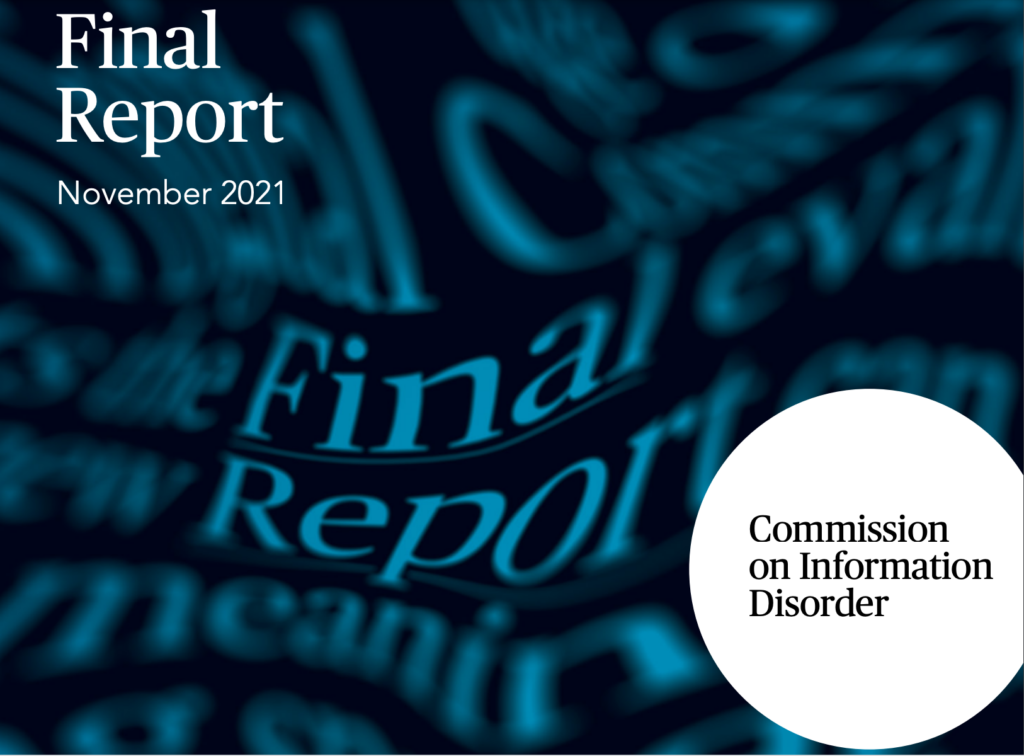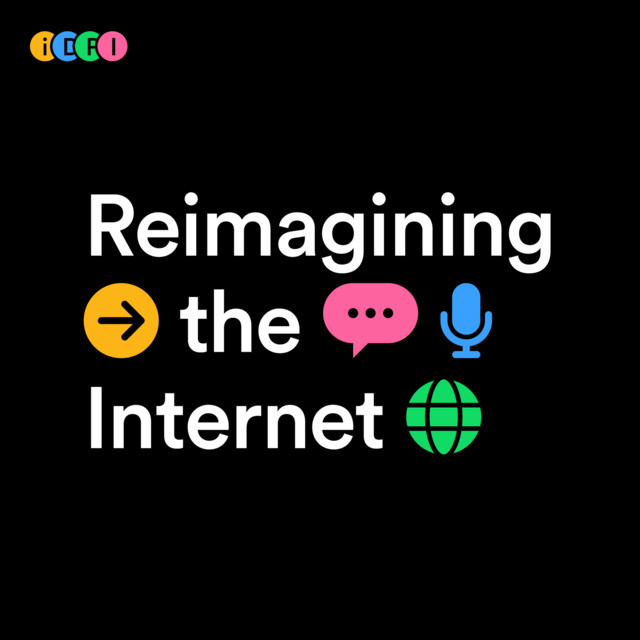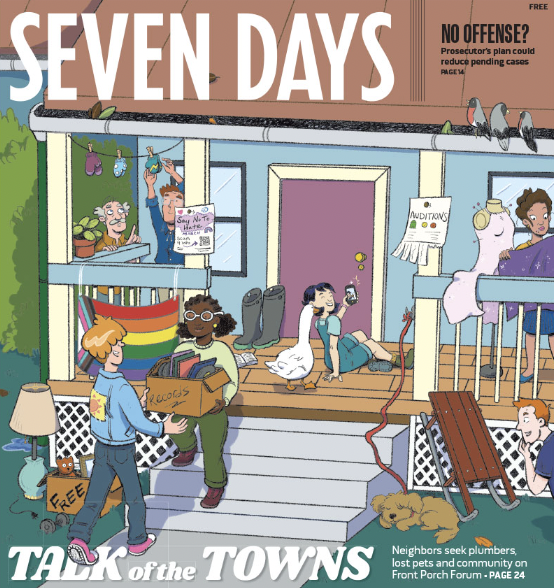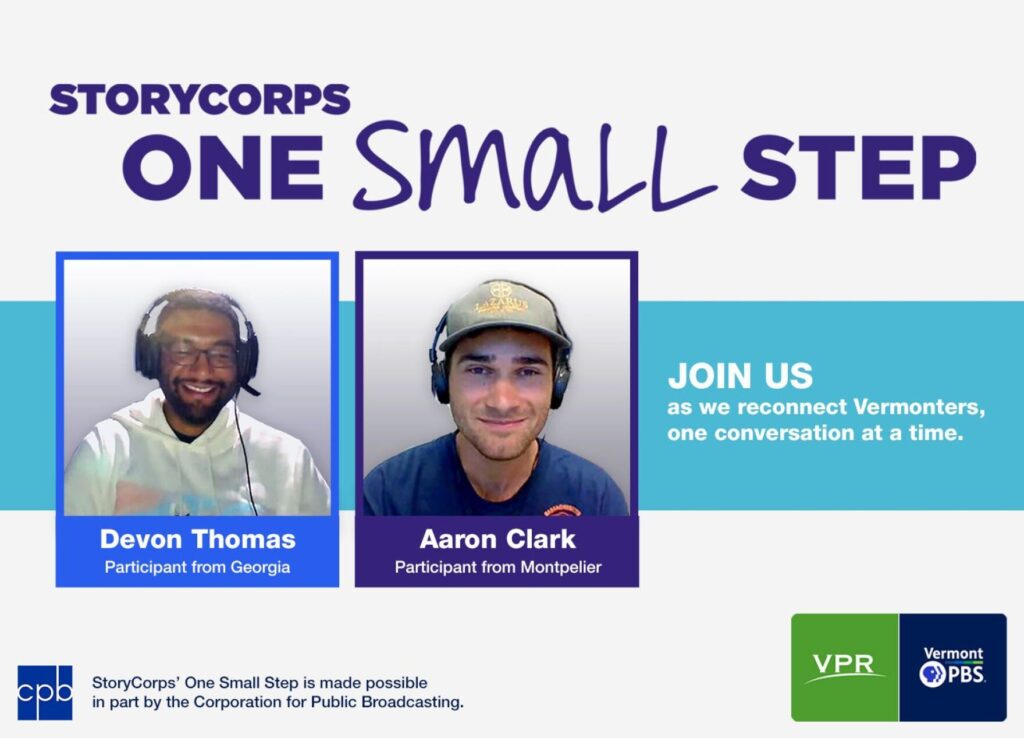Category Archives: In the News
Front Porch Forum is Part of “Why We Shouldn’t Give Up on the Internet”
New_ Public’s Eli Pariser Delivers a Speech at the Vatican Featuring Front Porch Forum
Eli Pariser is an author, activist, and entrepreneur focused on how to make technology and media serve democracy. He helped lead MoveOn.org, co-founded Upworthy, wrote “The Filter Bubble,” and is currently Co-Director of New_ Public. He has highlighted Front Porch Forum in numerous pieces and conversations, shining a light on its ability to lead to healthier communities thanks to its intentional design.
You can imagine our surprise – and delight – when he delivered a powerful speech to an audience that included Pope Francis at the Vatican’s Jubilee of the World of Communications – and put Front Porch Forum at the heart of his argument for “why we shouldn’t give up on the Internet.”
Here’s a highlight:
In Vermont, a small state in the northeast of the United States, people use Facebook and TikTok but town conversation mostly doesn’t happen there. They have something more like an actual digital town square — a home-grown social network called Front Porch Forum built specifically for the purpose of allowing towns to have good discussions.
Front Porch Forum has never taken venture capital and isn’t seeking to make a ton of money from advertisers. In fact, it’s a public benefit corporation that is not intended to make more money than is required to sustain itself. It’s always been built not for advertisers but to serve communities in Vermont first. And as a result, it can do conversations differently.
Because it doesn’t need to worry primarily about advertisers or engagement, instead of optimizing for the most posts possible, FPF optimizes for thoughtfulness — by updating only once a day. It’s a bold statement that says: slow down. Think about what you’re saying. And say something meaningful. And among other things, it makes having a flame war really arduous, because you have to be willing to carry it on for days at a time.
One of the things that FPF shows us is that these aren’t places we need to spend a lot of time for them to change us and foster stronger communities.
In our offline lives, places of worship are a great example of this: Even among the faithful, there are few that spend a large proportion of our time literally inside a church or synagogue or mosque or temple. But the parts of us that are nourished by these spaces remain fortified when we leave.
The same is true of the digital public spaces — we don’t need to vanquish Meta or TikTok entirely to make digital space building worth doing. People use Instagram in Vermont too… but FPF adds to their lives.
Front Porch Forum also puts its money where its mouth is when it comes to stewardship — in fact, while only a tiny fraction of people at TikTok or Meta work as moderators, at the 40-person organization of Front Porch Forum, half of the employees are paid moderators.
With this ratio of stewards to content, every single message can be read before it reaches everyone else to make sure it conforms to the very clear and thoughtful set of norms that have been co-developed over 20 years with community members. And when messages don’t — which happens sometimes — they don’t just disappear. Instead, you get a friendly note from one of the stewards asking you to phrase things differently.
And so, conversation goes better. People know their neighbors better. Communities are healthier. We conducted survey research on Front Porch Forum’s impact and found that not only did people across the political spectrum and across demographics like it much more than Facebook or Nextdoor, they also got more involved in the life of their town and were more committed neighbors as a result.
Of course, Front Porch Forum only exists in one small state in the United States. In most places around the country and the globe, these local conversations happen in forums like Facebook Groups and Nextdoor that are much less well designed for this purpose. But at New_ Public, the nonprofit R&D lab I run, we think Front Porch Forum is on to something big.
Read all about the experience in this New_ Public blog post.
Read the speech in its entirety here.
Watch and listen to Eli’s address (the bit about Front Porch Forum can be found at the 32-minute mark)
Washington Post features Front Porch Forum Impact in Vermont
Check out the new article in the Washington Post: “The friendliest social network you’ve never heard of.”
The coverage stems from a member survey (thanks to the over 13,000 who participated last year!) and report produced by New_ Public, a nonprofit research and development lab that aims to create healthy digital public spaces for people to connect and thrive. Will Oremus, a reporter at the Washington Post, was intrigued by their report and newsletter about Front Porch Forum. I had the chance to talk with him at length about the history and purpose behind FPF. And, we offered him temporary access to a few Forums and put him in touch with several members.
Oremus notes, “New research from the nonprofit New_ Public finds Front Porch Forum is one of the few online spaces in America that leaves its users feeling more informed, more civically engaged and more connected to their neighbors, rather than less so. What’s more, its users seem to genuinely like it.”
Here are some of the key highlights of the membership survey:
- 97% of members find FPF valuable for their community
- 93% of members find FPF useful personally and for their family
- 80% of members feel that people treat each other humanely on FPF
- 85% of FPF members frequently turn to their Forums for local news
- 80% of FPF members indicate they are more informed about local issues thanks to FPF
- 78% of members see FPF as a reliable source of information
The credit for these accolades deserve to be attributed to those who are sharing information. It’s FPF members who are engaged. It is the meetings, chicken eggs, library activities, baby strollers, and electric knife sharpeners of Vermonters that are at the heart and soul of this platform. For that, Valerie and I, and the whole team at FPF, are grateful.
Talking “Good Web” with Initiative for Digital Public Infrastructure at UMass Amherst
“How did Vermont’s favorite civic social network turn into a climate disaster response network overnight? Michael Wood-Lewis Tells Us About His Local Good Web”
Producer Mike Sugarman joined Michael Wood-Lewis in the Front Porch Forum office in Burlington to provide an “inside look at how Vermont’s favorite civic social network runs.”
The episode mentions the Seven Days article “Talk of the Towns: Neighbors Seek Plumbers, Lost Pets and Community on Front Porch Forum” as well as forthcoming research from two-time Reimagining guest Talia Stroud for New_ Public.
Michael talks about why Front Porch Forum works in Vermont (as opposed to, say, a suburb of Phoenix), what it means to be a Vermont Public Benefit Corporation, and helping communities to build resilience. “Front Porch Forum is in the business of … increasing social capital among neighbors, increasing the vibrancy of the local Main Street businesses, increasing the vitality of the local nonprofit sector, increasing, improving involvement with local democracy.”
Listen to the full (and rather inspiring) conversation with Mike and Michael here.
Fixing Digital Public Spaces
Leslie Stebbins was quoted in a recent Salon article, “Our digital public spaces aren’t so healthy… Can we fix that?” (read full article here) that…
“Tech companies maintain that they cannot moderate online communities because that would jeopardize our right to free speech and because there is simply too much content flying across these networks to track. Both these issues are false flags. We now know that the core infrastructure of these platforms is intentionally designed to amplify vitriol and misinformation because this increases engagement, keeps us online longer, and provides tech companies with billions of dollars from ad revenue. It doesn’t have to be this way.“
Further, Stebbins adds, “We should focus on creating new spaces that have explicit civic goals and are designed for equity and social cohesion. Real-world communities need to be involved in intentionally designing their own local digital public spaces rather than leaving this work to global tech companies.”
Front Porch Forum gets a nice spotlight in the article…
“Front Porch Forum […] focuses on real world community building. It is the antithesis of Facebook, TikTok, and Twitter. Rather than try to keep users online, it strives to get people offline and more connected to their local Vermont neighbors. Most people spend five or ten minutes a day online to get news that their neighbors have posted: lost dogs, bake sales and announcements of upcoming school board meetings. It is funded by donations and local ads based on where someone lives, but it does not track user behavior and advertising does not drive platform design.“
“Independent research on Front Porch [Forum] shows that it builds social cohesion and is improving the resilience of local Vermont communities. Building stronger community cohesion produces many intangible benefits such as high civic engagement, more instances of neighbors helping neighbors, and lower crime rates.“
Another Shout Out to FPF in NY Times
Thanks to Jill who just posted on the Craftsbury Forum:
“I just came across this New York Times article recognizing the great job Front Porch Forum is doing with keeping Vermonters connected. I know my family and I are grateful for the network it provides.”

A Kinder, Gentler Social Network
Big Tech and social media giants are under the microscope more than ever. Front Porch Forum continues to draw attention from news outlets as the more friendly alternative among sites that are meant to connect us.
Julia Angwin, Editor-in-Chief of The Markup, a popular publication investigating Big Tech, recently spoke with FPF’s co-founder Michael Wood-Lewis to learn more about how FPF keeps conversations neighborly and kind, while other social media sites seem to be losing civility.
Read the full interview here.
Healthy Digital Discourse
The Aspen Institute just issued its Commission for Information Disorder final report. We’re humbled to see Front Porch Forum recognized among a short list of approaches that are making real progress instead of feeding the spread of disinformation. The commission includes celebrities like Craig Newmark, Katie Couric and Prince Harry, along with an array of national experts.

FPF was held as an example of how to
“Develop and scale communication tools, networks, and platforms that are designed to bridge divides, build empathy, and strengthen trust among communities.“
Healthy Social Media? Experts Weigh In
Vermont’s own example of “Small Tech,” Front Porch Forum, drew several mentions this past week as the antithesis of Facebook and other destructive Big Tech.
Michelle Goldberg stated in the New York Times:
“Deb Roy, director of the M.I.T. Center for Constructive Communication and former chief media scientist at Twitter,… believes that the potential for a healthy social media exists — he points to Front Porch Forum, the heavily moderated, highly localized platform for people who live in Vermont. But it’s notable that his best example is something so small, quirky and relatively low-tech. Sure, there are ways of communicating over the internet that don’t promote animosity, but probably not with the platforms that are now dominant.“
While Jason Kelley and Danny O’Brien at the Electronic Frontier Foundation shared…
“[FPF] users say that while most of the internet ‘is like a fire hose of information and communication, Front Porch Forum is like slow drip irrigation.’ While many of the most popular social networks need to scale to perform for investors, which relies on moving fast and breaking things, Front Porch Forum could be described as a site for moving slowly and fixing things.”
And civic tech expert Micah Sifry said in his SubStack newsletter The Connector…
“Ian Bogost makes a good argument in The Atlantic for legislators or regulators setting speed and volume limits on sites like Facebook. Getting the tuning right won’t be simple, but in the same way that we’ve come up with safety rules for all kinds of products, we need them for social media. I’d start by looking at what has worked for a platform like Front Porch Forum, and try limiting the size of people’s ‘friend’ lists and the speed of comments.”
About Blog
Ghost of Midnight is an online journal about fostering community within neighborhoods, with a special focus on Front Porch Forum (FPF). My wife, Valerie, and I founded FPF in 2006... read more
Post Categories
- Uncategorized
- PDF2009
- Calendar
- Northeast Kingdom
- podcast
- Peer Rental
- Localization
- Big Tech
- Events
- PDF2007
- Web Traffic
- Google AdSense
- Pay It Forward
- Elections
- berkmansunlight
- Maps
- Video
- Upstate New York
- Coupons
- Wildlife
- Mobile
- Viral Marketing
- Raffle
- Crisis Response
- Donations
- Lost & Found
- Gratitude
- Real Estate
- College Students
- Social Responsibility
- Orton Family Foundation
- Start ups
- Best of FPF
- Make It Your Own Awards
- Online Civility
- Clay Shirky
- Newspapers
- How To Use FPF
- Humor
- Online Classified Ads
- Peer Reviews
- Politics
- Community Management
- Economic Development
- Local Reviews
- Case Foundation
- Borrow and Lend
- Neighborhood Watch
- Good Government
- Small Business Advertising
- Citizen Journalism
- e-Vermont
- Democracy
- Local Search
- Knight Foundation
- Burlington
- MacArthur Fellows
- Civic Engagement
- Social Media
- social capital
- Social Networking
- Vermont
- Neighborhood
- Community Building
- Local Online
- Front Porch Forum







